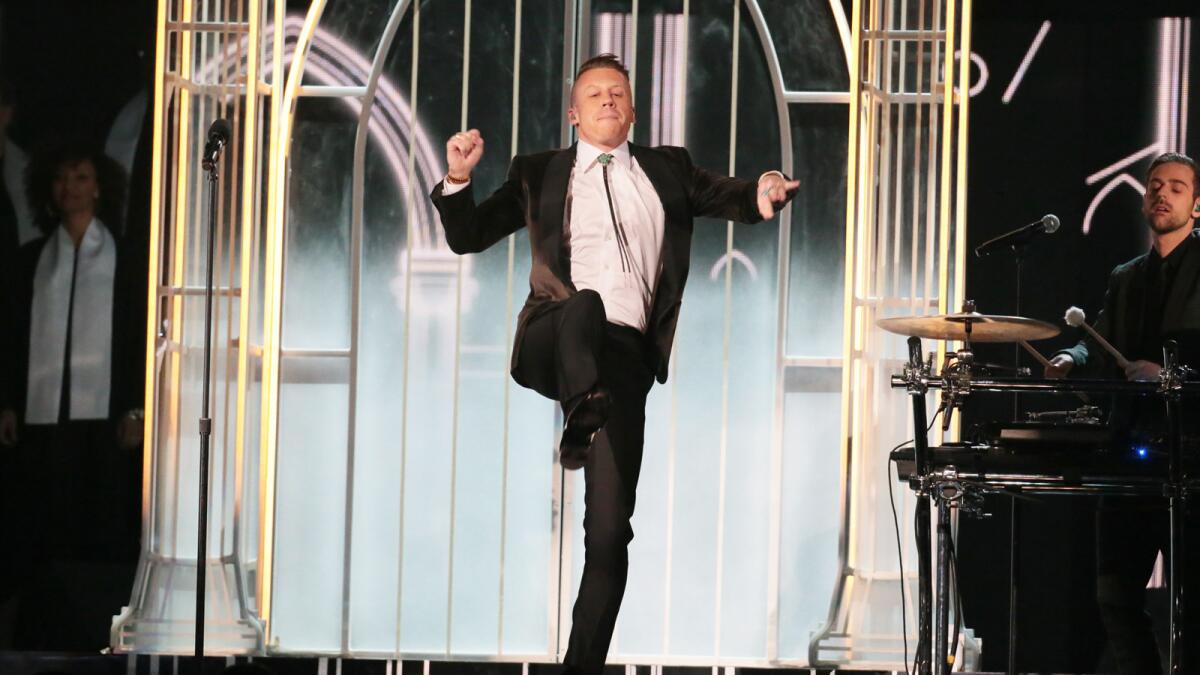Reporter’s Notebook: Macklemore’s ‘White Privilege II’ is so self-flagellating that it hurts

Macklemore, inspiring more questions while onstage at the Grammys.
Is it possible for a rapper to second-guess himself out of existence?
Macklemore has a new single, “White Privilege II,” a contemporary sequel of sorts to his song “White Privilege.” And if you ever thought that what hip-hop needed most in 2016 was nine minutes of a self-flagellating Jezebel commenter vortex from the guy who beat Kendrick for a rap Grammy, oh how Macklemore has delivered.
Grammy Awards 2016: Full coverage
The last time Macklemore used a single to insert himself into a civil rights conversation, it was gay marriage with “Same Love,” where he played wedding bandleader for couples getting hitched at the Grammys. After that followed plenty of garment-rending about why a straight white guy would need to write and champion a rap song about this topic. But perhaps it helped move the cultural needle at a time when nationwide gay marriage was a less certain outcome.
But “White Privilege II” is an even more fundamentally Macklemore-ian achievement: a song about how he doesn’t feel like he has the right to speak in today’s Black Lives Matter movement, manifested as nine minutes of him rapping about this subject.
It’s easy to pillory: Perhaps no pop musician has received more eye-rolling from the very left-leaning activists and black hip-hop audiences he so values as his fan base. It’s clear that Macklemore now gets that himself.
And to be fair, if one forgives the song for lacking the qualities that make hip-hop fun to listen to, “White Privilege II” is a thorough and aware synopsis of current dialogue about white people’s role in the civil rights conversation.
The song is self-aware about how Macklemore’s presence potentially pushes other marginalized voices out: “Is it my place to give my two cents / Or should I stand on the side and shut my mouth for justice?” It’s stone-sober about his own role in cultural appropriation as a white rapper: “You’re Miley, you’re Elvis, you’re Iggy Azalea / Fake and so plastic, you’ve heisted the magic.” It came with a manifesto that prioritized white allies like himself taking a back seat in activism: “We wish to support direct organizing and be led by the expertise and experience of those on the front lines as we proceed.”
#OscarsSoWhite: The boycott, reaction and more
It’s almost uncanny how precisely he walks the contemporary line about how a straight white male should talk about his place in the conversation around these issues. There is no leftist critique of this song that you could make that Macklemore didn’t make first.
I have struggled all morning to make fun of this song, and I genuinely can’t do it without saying anything that Macklemore didn’t already address in the lyrics. One could make the argument that given his straight-white-rich-male vantage point, he should shut up entirely. Fair point. But I don’t think that’s a winning pitch to the rest of America who activists have to win over.
But that’s the funny thing about music: It doesn’t care about toeing the right lines. More than appropriation, more than sexism, the only truly unforgivable crime is to be lame. The history of music is the history of working out dark, socially unacceptable ideas in song: Kidnap your wife and lock her in your car trunk, hunt down your ex for dating another man: We can disagree on a song’s virtues, but even when it’s morally “wrong,” a potent song’s vitality speaks for itself.
And that’s the cruel irony of “White Privilege II.” The song will yield a day or two of Internet sneers, and that’s sort of a shame: Well-meaning white people should be reflecting on and re-evaluating themselves with these ideas all the time, especially if they’re inclined to activism. White people need other white people calling them on their shortcomings, and Macklemore has a bigger platform than the average person.
But Macklemore failed at the one job of pop music, which is to make something commanding. I don’t know any rap fan who would ever want to return to nine minutes of hookless self-recrimination from a guy singing about why he doesn’t feel like he has a place to sing.
Kendrick did more with a single, assured four-word phrase, one that not coincidentally became an anthem for the movement Macklemore just spent nine minutes tying himself in knots to support.
Follow @AugustBrown for breaking music news.
MORE:
The two sides of Charlie Puth: baby-faced tween idol and hard-core music nerd
Watch Iggy Pop and Josh Homme debut ‘Gardenia’ on ‘Colbert’
More to Read
The biggest entertainment stories
Get our big stories about Hollywood, film, television, music, arts, culture and more right in your inbox as soon as they publish.
You may occasionally receive promotional content from the Los Angeles Times.










